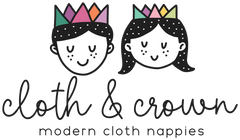Is cloth really best for baby?
When we first discover that we are pregnant and bringing a new baby into the family, we are met with a LOT of decisions. Which car seat is the safest? Am I going to breast or bottle feed? Am I going to use disposable nappies or are cloth nappies better for baby?
As the mum of four, I understand how overwhelming all of these decisions are, so let's take a closer look at cloth nappies and the benefits to you and your baby.
Better for baby's skin
Cloth nappies are made from material that is waterproof, breathable, free from plastics and with soft, stay-dry layers that help keep baby dry. Not only that but many inserts are made from natural materials like bamboo, cotton and hemp which are super absorbent alternatives to the chemical-laden core of a disposable nappy.
Many mums of babies with sensitive skin find that they cannot wear disposables as they break out in rashes. They often have much better luck with cloth nappies that are lined with materials such as athletic wicking jersey that is especially good for sensitive skin types as it is both breathable, moisture wicking and cooling.
It's a good idea to always use a moisturising or barrier cream on bub, especially when they are teething when poop tends to be more acidic and babies are more prone to getting rashes.
Better for landfill and waterways
Disposable nappies contain plastic and so does the packaging they come in.
Much of this plastic will go to landfill. And so the human waste inside the nappy can then end up in the water system.
When reusable nappies are washed, on the other hand, faeces end up in the waste water supply, which means they are then treated in a water treatment plant, in the same way adult waste is.
Better for your budget
On average one child uses approximately between 6000 - 7000 disposable nappies which will cost between $3000 - $4000.
A full stash of reusable cloth nappies might cost you between $700 - $800 in upfront costs, but the REAL savings come in when you look at the lifetime of those cloth nappies.
If you reuse your stash for multiple children, then you will save up to $11,300 if you have three children in cloth nappies.
That money could be put to use for baby in better ways such as going towards family holidays, activities or towards future school fees.
Better in times of crisis
In 2020, we all experienced the impact of COVID 19 both within our own families as well as within our greater communities and across the globe. One of the things the pandemic highlighted was how important being able to live more sustainably and provide for ones family in times of crisis is. Not being able to source toilet paper, meat and other necessities became a very real threat which is why having a reusable option such as cloth nappies gives a real peace of mind that your baby's needs will be met.
Better for the planet - your baby's future
The University of Queensland study looked at four environmental indicators: water resource depletion, non-renewable energy depletion, solid waste and land use for resource production. It considered the ‘life cycle’ impact: from the growing of cotton (for the cloth nappies) and timber (for the wood pulp used in disposables), the manufacture of the nappies and transportation, through to use (including water & energy used in washing cloth nappies) and disposal.
Not only was it found that the water usage between cotton nappies and disposable nappies was comparable, they also found that disposables used more energy and more land resources in their production and that disposables generate 20 times more solid waste.
When we think about if cloth nappies are better for baby, sometimes it's easy to overlook the bigger picture. But that's one of the reasons why cloth nappies are so awesome! You have a real, tangible way of creating a better planet and a better future for your child.
Better for Mum
It's widely known that in many ways cloth nappies can be seen as more of a hobby for mum than it is for baby.
Research shows that mums who take part in self-care by doing things like taking up hobbies, socialising with others and participating in activities that they find enjoyable, are doing wonderful things for their own mental health and wellbeing.
As postnatal depression affects about 1 in every 7 women who give birth in Australia each year, these kinds of activities that make motherhood more enjoyable, means a happier, healthier mum which is always better for baby!











Leave a comment